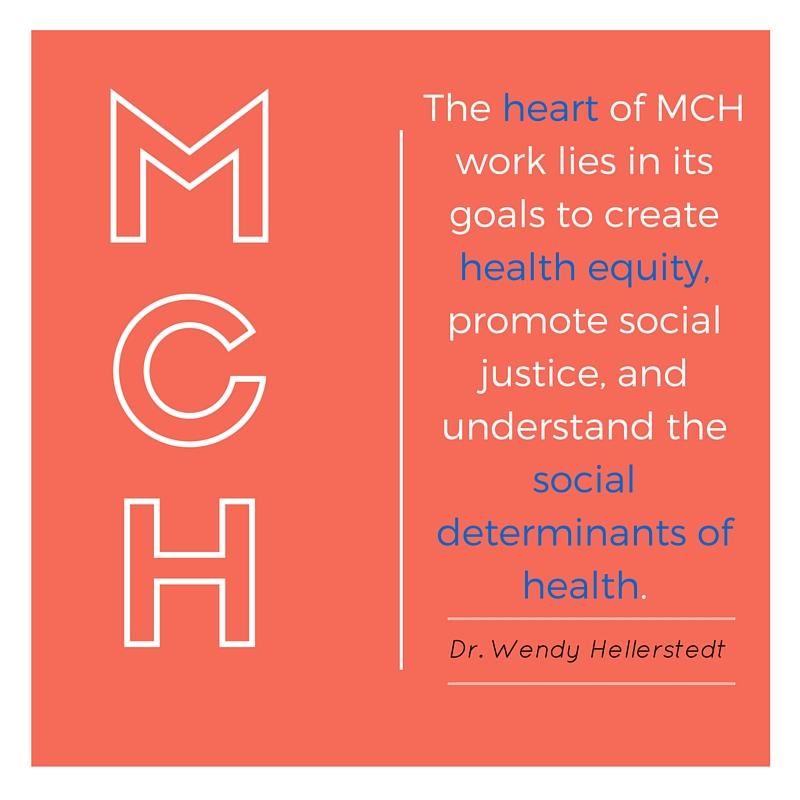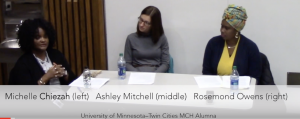by Wendy L. Hellerstedt, MPH, PhD, Professor Emeritus
I had the privilege of being affiliated with the Maternal and Child Health (MCH) Master of Public Health Program—and the Center for Leadership Education in Maternal and Child Public Health—at the University of Minnesota (UMN) for more than 20 years. But, I still don’t have a simple response to a question I have been asked hundreds of times: “What is Maternal and Child Health?”.
Vulnerable Populations
MCH is a public health sub-field that began by focusing on a specific population (mothers and children), rather than a method (e.g., epidemiology) or skillset (e.g., health policy). The national focus on MCH in the US began in 1912 when President Taft established the Children’s Bureau, consistent with efforts in the US to protect children who were vulnerable to mortality, morbidity, or social conditions (like child labor). Government interests were extended to mothers who were the primary child caregivers. Even in its early days, though, the development of MCH extended beyond concerns for mothers and children: advocates of birth control, for example, are counted among MCH’s early leaders.
Today MCH work is clearly not limited to mothers and children, as evidenced by the MCH Bureau’s (MCHB) website, which details its promotion of the health of families, adolescents, and women—as well as that of mothers (and pregnant women) and children.
The MCHB also reflects concerns about health equity and the reduction of health disparities—for everyone, not just mothers and children. The ability to demonstrate “cultural competence” is, in fact, considered critical for MCH leaders. Beyond the US, it is also difficult to disentangle health equity from global MCH advocacy and program development.
What are the elements of an MCH perspective?
To identify with MCH may reflect a professional approach and a way of thinking about public health that involves at least the following elements:
1. MCH is about populations who are—for social, physical, genetic, economic, or political reasons—vulnerable to having poor health.
The MCH perspective is that cultural norms that stigmatize individuals because of race, sex, gender, age, resi- dence, or class create vulnerabilities that require a public health response.
2. The heart of MCH work lies in its goals to create health equity, promote social justice, and understand the social determinants of health.
MCH has a long and strong history of advocacy to (1) change or remove institutions, practices, and conditions that create or sustain vulnerabilities or disparities in health; and (2) develop fair and equitable environments (school, work, residence) and public health systems, programs, and policies.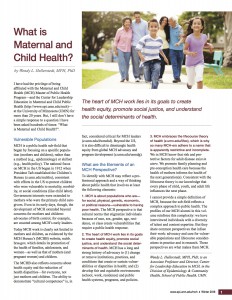
3. MCH embraces the lifecourse theory of health.
The lifecourse theory is why so many MCH-ers adhere to a name that is apparently restrictive and incomplete. We in MCH know that risk and protective factors for adult disease exist in utero. We promote family planning and pre-conception health care because the health of mothers informs the health of the next generation(s). Consistent with the lifecourse theory is our knowledge that every phase of child, youth, and adult life influences the next phase.
I cannot provide a simple definition of MCH, because the sub-field reflects a complex approach to public health. The profiles of our MCH alumni in our volume of Healthy Generations MCH Professionals Making a Difference for Families, Children, Youth, Women, and Priority Populations reinforce this complexity: we have interviewed individuals with a diversity of talent and content expertise. But they share common perspectives that infuse their work: advocacy and care for vulnerable populations and lifecourse considerations in practice and in research. Those perspectives are what makes them MCH.
Adapted for the web from the article “What is MCH?” appearing in the Winter 2016 volume of Healthy Generations. Wendy L. Hellerstedt, MPH, PhD, is Professor Emeritus and former MCH Program Director, Division of Epidemiology & Community Health, School of Public Health, UMN.
What do MCH professionals do? 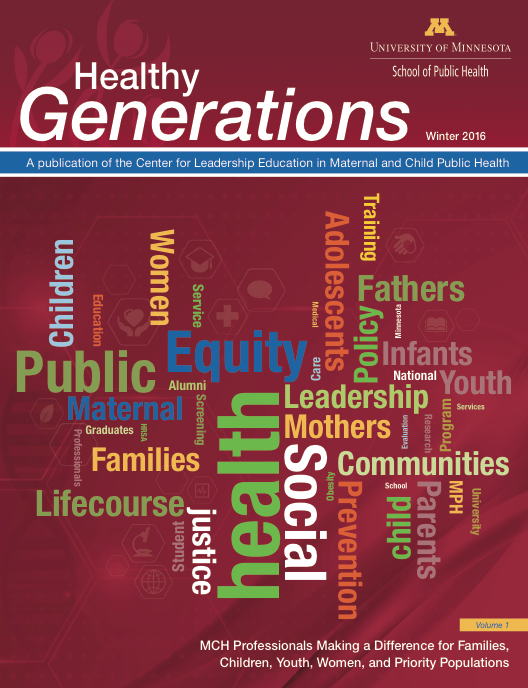
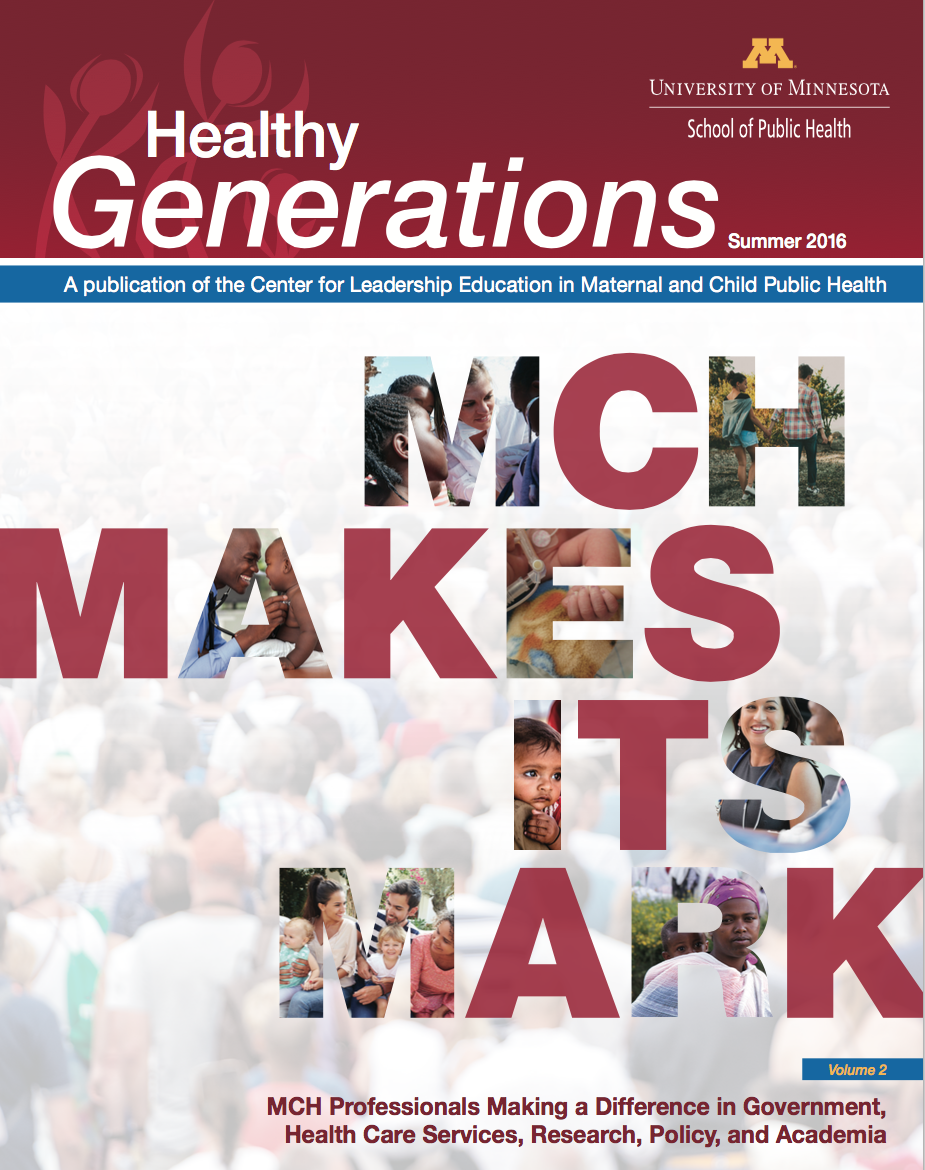 Read about just a few of our alumni in two of our publications:
Read about just a few of our alumni in two of our publications:
What are the MCH Leadership Competencies?
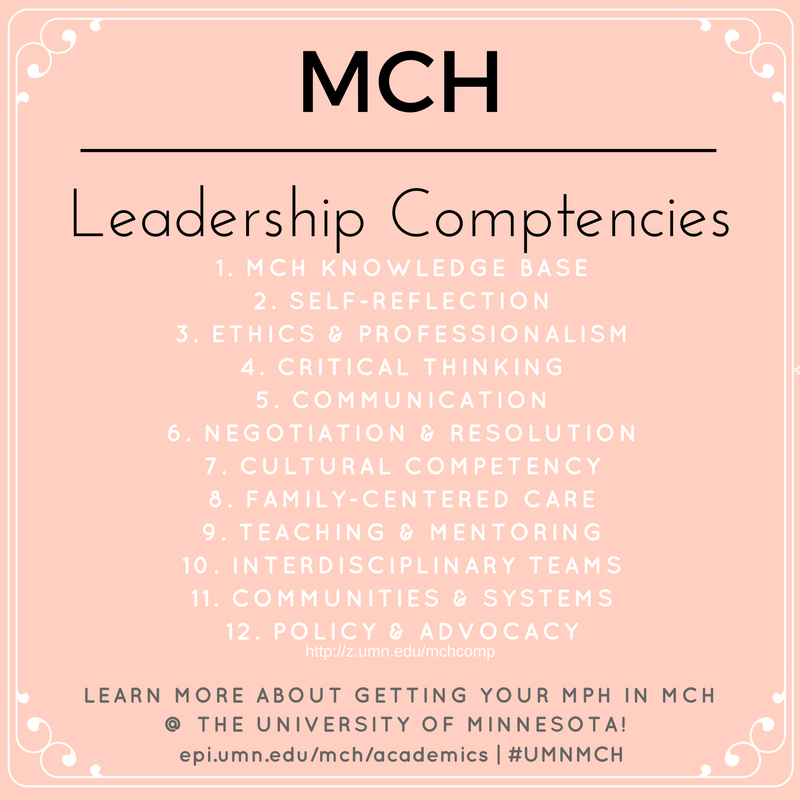 The developmental progression of leadership is of particular importance to those involved in the professional and continuing education of MCH health professionals. Leadership ability grows—from self to others to the wider community—as the knowledge, skills, and experience of the individual expands and deepens.
The developmental progression of leadership is of particular importance to those involved in the professional and continuing education of MCH health professionals. Leadership ability grows—from self to others to the wider community—as the knowledge, skills, and experience of the individual expands and deepens.
The MCH leadership competencies are presented in a progression from self to wider community which demonstrates the widening contacts, broadening interests, and growing influence that an MCH leader can experience over a professional lifetime.
Want More on MCH?
Thirteen MCH training programs across the country (including ours!) created We Are MCH (Prezi), a visual narrative of the MCH public health work and research in our communities to better define ourselves to the community and potential students. Of the 35 stories, four are from our own U of MN faculty, students, graduates or community colleagues. There are also three short Prezis, with about a dozen stories each: We Are MCH – Mini 1, We Are MCH – Mini 2 and We Are MCH – Mini 3.
